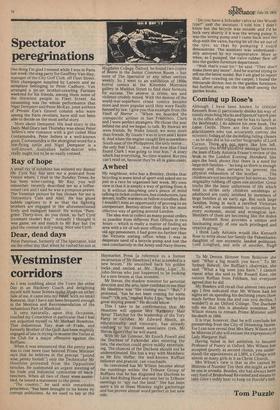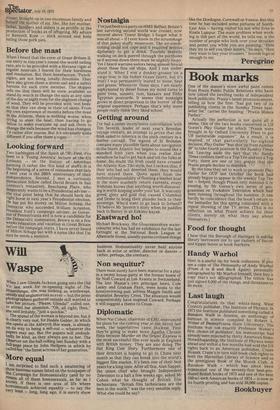Spectator peregrinations
One thing I'm glad I missed while I was in Paris last week: the stag party for Geoffrey Van-Hay, manager of the City Golf Club, off Fleet Street. With champagne supplied by Lanson and an aersplane belonging to Peter Cadbury, Van arranged a jet-set brothel-crawling Parisian weekend for his friends, among them some of the thirstiest people in Fleet Street. So nauseating was the whole performance that Nigel Dempster and Peter McKay, joint authors of Private Eye's Grovel column who were among the Paris revellers, have still not been able to decide on the most awful story.
More about Dempster. His lead story in the Daily Mail Diary last Thursday was about Peter Sellers's new romance with a girl called Miss Cootamundra. Peter Sellers is a well-known goon, Cootam,undra is the aboriginal word for a low-flying turtle and Nigel .Dempster is a well-known Australian ballet-dancer who really ought not to be so easily conned.
Ray of hope
A small ray of sunshine has entered my dismal life. Cyril Ray has sent me a postcard from Venice where, I read in the Sunday Times, -he has been wine-tasting. Mr Ray, you will remember, recently described me as a toffeenosed twit and I said he was a pompous prawn. The Venetian picture he has chosen for me is Tintoretto's 'Cain and Abel.' He has glued bubble captions to it so that the fighting brothers are engaged in the aforementioned lively and inelegant banter. He writes "Peregrine: Thirty-love, do you think, so far? Cyril (constant reader) Ray.'' Actually I thought it was game, set and match to Mr Ray but I'm glad the contest is still young. Nice one Cyril.
Dear, dead days
Peter Paterson, formerly of The Spectator, told me the other day that when he visited his son at Magdalen College, Oxford, he found two copies of Beano in the Junior Common Room — but none of The Spectator or any other serious weekly. So I went to an exhibition of 1950s horror comics at the Kinsman Morrison gallery in Maddox Street to find their formula for success. The answer is crime, sex and violence crudely mixed. With the demise of the world-war-superhero crime comics became more and more popular until they were finally banned by law. I give you this example from the Vault of Horror — "When we boarded the transpacific airliner in San Francisco, Clark and I were perfect strangers. He chose the seat behind me and we began to talk. By Hawaii we were friends. By Wake Island, we were more than friends. By Guam I was in love and 1 knew it. And when the engine caught fire somewhere South-east of the Philippines, the only terror .,.. the only fear I had. .. was that now that I had found Clark I was going to lose him." A story which has everything. No time wasted. But you can't read on, because they're all in glass cases.
Awheel
My neighbour, who has a Bentley, thinks that bicycling is some kind of sport and asked me to join in a race he organised last week. My own view is that it is simply a way of getting from A to B without disturbing one's peace of mind talking to ticket collectors, bus conductors, taxi drivers, traffic wardens or fellow-travellers. But I wouldn't miss an opportunity of proving to an unrepentant Bentley-driver that it's the most effective way of getting around London.
The idea was to collect as many postal orders as possible from different Post Offices in two hours — which is really a matter of finding an area with a lot of sub-post offices and very few old age pensioners. I had gone no further than the Victoria sorting office when 1 was in desperate need of a bicycle pump and lost the race conclusively in the Army and Navy Stores.
-Do you have a Schrader valve or the Woods type?" said the assistant. I told him I didn't know but the bicycle was outside and I'd be back very shortly if it was the wrong pump. It was the wrong pump and I came back into the shop with the valve, having let all the air out of the tyre, so that by pumping I could demonstrate. The assistant was understandably annoyed by my reappearance. More so when, as I pumped, the valve rubber flew off into the garden furniture department.
"Well that's your lot," he said. "They don't make them any more". And he started trying to sell me the latest model. But I am glad to report that, after crawling on the carpet, I found the minuscule device, not in the garden furniture, but further along on the top shelf among the garden books.
Coming up Rose's
Although I have been known to criticise Kenneth Rose (I particularly dislike his way of noisily munching Marks and Spencer's pork pies in the office after Willing me he has to lunch at the Beefsteak), I do admire his new book, The ,Later Cecils. There are few Grub Street Pr4ctiticohers who can accurately convey the eccentric foibles of the dwindling ruling classes — as he also did in his earlier biography of Lord Curzon. Therg,.k.rp..nvt, nit any like him left. Certainly this fettre'plauftiO message between the lines oftady Antonia Fraser's review of the book in the London Evening Standard. She Says -the book shows that there is a need for large rich families — "as long as there is enough money and thus servants to prevent the physical exhaustion of the mother . . . The children are not less intelligent but more so, their originality rubbing off upon one another. Great truths like the basic unfairness of life which tend to strike only children amidships at adulthood are cosily imbibed by members of large families at an early age. But such large families, living in such a rarefied Victorian world, are now condemned to extinction by every economic, social and ecological law. Members of them are becoming like the dodos . , . Kenneth Rose provides a unique and fascinating study of one such privileged and creative group."
I think Lady Antonia would like Kenneth Rose to write about her family the Pakenhams; daughter of one eccentric landed politician, Lord Longford, and wife of another, Hugh Fraser, brought up in one enormous family and herself the mother of six. She, like her mother, father, brothers and sisters is as prolific in the production of books as of offspring. My advice to Kenneth Rose — stick around and keep eating those pork pies.
Before the mast
When I heard that the crew of Great Britain II, our entry in this year's round-the-world sailing race, are to be provided with a Havana cigar at regular intervals I feared for their hardiness and resolution. But their benefactors, 'Punch' cigars, are not being totally frivolous. They have also given them a storm sail and a safety harness for each crew member. The skipper tells me that there will be crew available on stand-by watch to change the sails at any time of the day or night even for the slightest change of wind. They will be provided with 'wet beds' so that they can sleep in their oil skins. From my own experience of months before the mast in the Atlantic, there is nothing worse, when trying to steer the boat, than having to go below to wake everyone up and ask them to change the sails because the wind has changed. I'd rather alter course. But it's obviously quite
different if you offer them a'cigar..• •
Looking forward
Two harbingers of the 'Spirit of ,'76%. First, -I've been to a 'Young America' lectureat,the• US Embassy — on the history of American Painting (I rather like this kind of stuff). It is the beginning of a series of reminders that July 4 next year is the 200th anniversary of their independence. Second, I met a curiously immaculate 'fellow called David Brown in San Lorenzo's restaurant, Beachamp Place, who desperately wants to be a Presidential adviser — the vital point being that he should back the right horse in next year's Presidential election. He has put his money on Milton Schapp, the Democrat who succeeded William Scranton, President Ford's campaign adviser, as Governor of Pennsylvania and is now a candidate for the Democratic nomination. Brown is on a few weeks relaxation and vacation in Great Britain before the campaign starts. I have never heard of Milton Schapp but with a name like that I'm sure he needs a mention.
Nostalgia
I've just been to a party on HMS' Belfast, Britain's last surviving second world war cruiser, now moored above Tower Bridge. I forget what it was all about — if I ever knew in the scrummage of that pokey stuffy messroom. The air-conditioning could not cope and it required serious diplomacy to get a drink. Tourists breezily walking on deck peered through the portholes as if anyone down there must be slightly loopy. Yet I heard wartime sailors being almost lyrical about these fine old ships. And I can under stand it. When I was a donkey-greaser on a cargo boat in the Indian Ocean (sorry, but it's true) I was permanently inured to noise, heat and grease. Whenever, these days, 1 am nearly asphyxiated by diesel fumes my mind turns to palm trees, sunsets, rum, bazaars and filthy Egyptian postcards. It seems that nostalgia grows in direct proportion to the horror of the original experience. Perhaps that's why some people really think they liked school.
Getting around
I've had a rather inconclusive conversation with Tim Severin, leader Of next year's Brendan voyage venture, an attempt to prove that the Irish sailed to America in the sixth century in a leather curragh. The legend of St Brendan contains many plausible facts about navigation in the North Atlantic but begins to sound like a standard Irish yarn when you realise that somehow he had to get back and tell the folks at home. No doubt the Irish could have crossed the Atlantic Kon-Tiki-style, but I reckon that, if their wits had not deserted them, they would have ,stayed there. Quite apart from the technical impossibility of floating a leather boat in the more southerly return currents, every Irishman knows that anything worth discovering is worth keeping under your hat. It was only greed, glory and gold that caused Columbus and Drake to bring their plunder back to their sovereign. Who'd want to go back to Ireland? I'll believe Mr Severin's story when he paddles back to Bantry in an Eskimo kayak.
Eastward ho!
Michael Brockway, the Gloucestershire watercolourist who has had an exhibition for the last fortnight at the National Book League in Albemarle Street, usually paints civilised things like the Dordogne, Cornwall or Venice. But this time he has included some pictures of SouthEast Asia — having visited his son who lives in Kuala Lumpur. The main problem when working in this part of the world, he tells me, is the number of people who look over your shoulder and pester you while you are painting. "First they try to sell you their sisters," he says, "then they want to buy your trousers." Sounds logical enough to me.
Peregrine



































 Previous page
Previous page